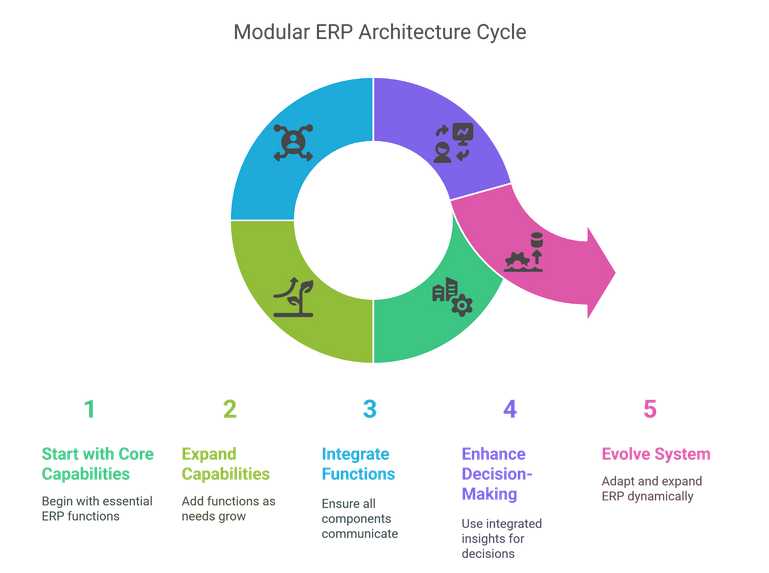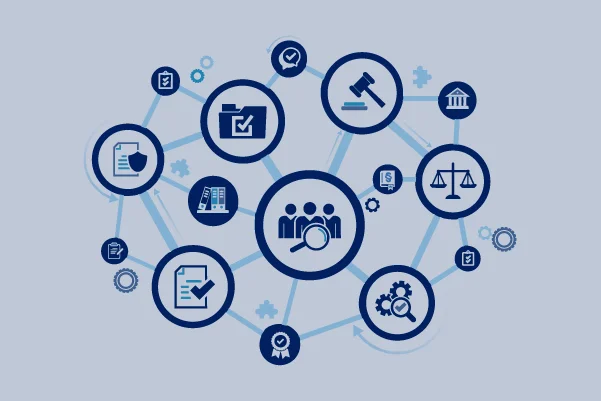What is Oracle ERP? For business leaders navigating growth, compliance, and accelerating digital transformation, it’s a system worth understanding. Oracle ERP refers to Oracle’s suite of enterprise resource planning applications—available both as a traditional on-premises system (Oracle E-Business Suite) and as a cloud-based solution (Oracle Cloud ERP).
These tools centralize financials, HR, supply chain, procurement, and more into one platform that’s designed to help businesses operate with greater speed, insight, and lower technical complexity.
“At its core, an Oracle ERP system helps organizations bring structure to complexity,” says Amresh Gupta, Oracle Application Practice Director at Vigilant Technologies. “It connects business functions, data, and teams in one integrated environment—that’s what makes it so valuable.”
In this blog, we’ll break down what Oracle ERP is, how it works, and why it’s becoming a strategic priority for modern enterprises. You’ll learn:
What is Oracle ERP?
Oracle ERP is a comprehensive suite of enterprise resource planning applications that are used to manage and integrate essential business functions, such as finance, procurement, supply chain, project management, human resources, and more. It’s built to help organizations improve operational efficiency, make faster decisions, and adapt to changing business conditions.
The term “Oracle ERP” refers to the broader ecosystem of ERP solutions Oracle has developed over time. This includes:
- Oracle Cloud ERP – Oracle’s modern, SaaS-based ERP platform, designed for agility, continuous innovation, and generative AI intelligence.
- Oracle E-Business Suite (EBS) – A mature, on-premises ERP system still used by many organizations. Though Oracle no longer offers it for new implementations, existing users can still access support and maintenance through approved system integrators.
At its core, Oracle ERP helps organizations unify data and operations across departments, providing a single source of information for critical business data. It’s more than data centralization—it’s the foundation for a smarter, more connected, and agile organization.
| 💡 Is Oracle an ERP system?
Not quite. Oracle is the company and Oracle ERP is the system it provides. When we talk about Oracle ERP, we’re referring to Oracle’s suite of enterprise resource planning applications for finance, operations, HR, and more. |
What is Oracle Cloud ERP?
Oracle Cloud ERP is Oracle’s modern, cloud-native enterprise resource planning platform. Delivered as a Software-as-a-Service (SaaS) solution, it gives organizations access to constantly updated tools for managing finance, operations, procurement, risk, compliance, and more—all in a secure, scalable digital environment.
The demand for cloud ERPs is growing. In 2023, the global market for cloud-based ERP systems reached a valuation of $34.83 billion, with forecasts indicating an average annual growth rate of 18% through 2030.
Unlike traditional ERP systems, Oracle Cloud ERP doesn’t require on-premises infrastructure, manual upgrades, or complex patching. The cloud platform is built for continuous innovation. It replaces the need for traditional on-premise infrastructure and supports a wide range of industries and business models.
Oracle Cloud ERP is also highly configurable, allowing businesses to align the system with their specific workflows and organizational structures.
Key capabilities include:
- Modular architecture, enabling phased deployment and flexible scaling
- Global readiness, with multi-currency, multi-language, and multi-entity support
- Automatic quarterly updates, delivering new features without manual upgrades
- Built-in AI and machine learning, supporting automation and predictive analytics
- Unified data model, integrating financial, operational, and workforce data in real time
This is the foundation where Oracle now focuses all ERP development, including advancements in automation, analytics, and artificial intelligence.
Oracle ERP’s Architecture: Modular, Unified, And Built For Scale
Oracle ERP is designed to support complex business operations through a modular yet unified architecture. Each component serves a distinct business function, such as finance, procurement, or project management, but all operate on the same platform and shared data model.
This structure gives organizations the flexibility to:
- Start with the functions they need and expand over time
- Maintain consistent data across departments and workflows
- Eliminate the need for disconnected tools or redundant processes
- Gain organization-wide visibility without building custom integrations
Each part of Oracle ERP is also designed to evolve with emerging technologies, including AI, predictive analytics, and digital assistants without disrupting daily workflows. That’s how Oracle ERP delivers flexibility today, with the power to scale and innovate for tomorrow.
How Does Modular Architecture Work? A Real-World Scenario
When investing in an ERP, a business might begin with a few core ERP capabilities and expand as its needs evolve, such as launching new business lines or entering new markets. Because every component runs on the same system, insights from one function immediately inform others, supporting faster and more coordinated decisions.
This approach stands in contrast to the common patchwork of disconnected systems—one for finance, another for inventory, yet another for time tracking or compliance.
Oracle ERP replaces that fragmentation with a centralized platform that allows a system to evolve dynamically, with as little friction, disruption and transformation as possible.

Business Benefits of Oracle ERP
Oracle ERP offers measurable gains for organizations looking to operate with greater precision, control, and responsiveness. Its architecture is designed to reduce friction between systems and teams, improve accuracy across workflows, and support strategic decision-making at scale.
Key business benefits include:
- Real-time visibility and reporting Oracle ERP consolidates operational and financial data into a single system with real-time dashboards and analytics. This enables faster, data-backed decisions across departments and executive leadership.
- Process standardization and automation System-driven rules and embedded machine learning automate routine workflows—from invoice matching to financial close—improving accuracy and reducing reliance on manual input.
- Scalability across business models and geographies With a global-ready framework and modular deployment options, Oracle ERP supports expansion into new markets and adapts easily to organizational changes without the need for complex reconfiguration.
- Embedded risk management and compliance Built-in audit trails, user access controls, and compliance monitoring help organizations meet regulatory requirements and reduce exposure to operational and financial risk.
- Reduced system sprawl and integration overhead By replacing multiple disconnected systems with one unified platform, Oracle ERP lowers the cost and complexity of maintaining integrations and managing cross-functional data.
- Continuous access to innovation Automatic quarterly updates deliver enhancements across AI, analytics, and usability without requiring downtime or disruptive upgrades.
Together, these benefits create the conditions for sustainable growth, operational resilience, and long-term strategic clarity.
💡 What does “make faster decisions” really mean in Oracle ERP? It’s more than a buzzword. Oracle ERP accelerates decision-making by combining:
- Real-time, unified data from finance, supply chain, HR, and operations, so there’s no need to reconcile information across systems
- Embedded analytics (via Oracle Transactional Business Intelligence) to generate live reports, KPIs, and dashboards
- AI-powered forecasting for cash flow, demand planning, and risk alerts
- Role-based access so decision-makers see exactly what they need—no bottlenecks
- Automated workflows for approvals, escalations, and exceptions that would otherwise delay action
Together, these tools eliminate manual delays and give leaders the insight—and confidence—they need to act quickly.
Who uses Oracle ERP?
Over 97% of today’s Fortune 500 companies rely on Oracle software. Oracle ERP is built to support mid-size to enterprise-level organizations operating in complex, fast-moving industries. It’s used by businesses that need to unify financials, operations, and compliance across multiple departments, locations, or markets.
Industries that frequently rely on Oracle ERP include:
- Financial services
- Hospitality and real estate
- Manufacturing and supply chain
- Mining and natural resources
- Healthcare and life sciences
- Public sector and higher education
These organizations often face challenges like regulatory oversight, global operations, large-scale procurement, and multi-entity financial management—areas where Oracle ERP’s integrated, cloud-based platform provides both structure and flexibility.
Vigilant supports Oracle ERP implementations and managed services across a range of industries. Some of our case studies include:
- Barrick Gold. A global mining company used Oracle ERP to automate AP processes and reduce time spent on invoice matching and exception handling. The implementation allowed the business to handle complex supplier networks with greater accuracy and less manual effort.
- Credit Acceptance. A financial services provider that needed to improve financial visibility and close processes across 8 business units. With Oracle Cloud ERP, Vigilant helped reduce close time, automate manual reporting, and create a unified view of organizational performance.
- Westmont Hospitality Group. A hospitality group managing over 250 hotels across North America streamlined procurement and supplier management with Oracle Cloud ERP. The project introduced standardization and cost controls while integrating with existing property management systems.
Whether managing thousands of invoices per month or coordinating financial operations across continents, these organizations turned to Oracle ERP—and Vigilant—to gain clarity, consistency, and control.
What to Consider Before Choosing Oracle ERP
Oracle ERP delivers significant value, but like any enterprise platform, it requires strategic planning to implement successfully.
For organizations evaluating whether it’s the right fit, there are a few key considerations to keep in mind:
- Implementation complexity Oracle ERP is a powerful, configurable platform, not a plug-and-play tool. A successful rollout requires clear objectives, executive alignment, and collaboration across departments. Partnering with an experienced Oracle integrator can reduce implementation challenges and better ensure project success.
- Internal process maturity ERP systems work best when business processes are clearly defined. Organizations with inconsistent workflows or siloed data may need to invest time upfront in standardizing operations to get the most out of the platform.
- Cloud readiness Oracle no longer offers new implementations of its on-premises EBS. Oracle Cloud ERP is the current standard, which means organizations must be comfortable adopting a cloud-first model, including quarterly updates, subscription-based licensing, and remote access considerations.
- Data migration and integration Migrating from legacy systems—or consolidating multiple platforms—requires thoughtful planning around data cleansing, transformation, and governance. Understanding how Oracle ERP will integrate with any systems that remain in place is also critical.
- Change management and training A new ERP system touches nearly every function of the business. Change management, communication, and user training are essential to drive adoption and minimize disruption during and after implementation.
Choosing Oracle ERP isn’t just a technology decision, it’s a long-term investment in how the organization operates and grows. With the right preparation, it becomes a platform for visibility, control, and continuous improvement.
Plan Your Oracle Journey with Vigilant
Oracle ERP can transform how your business operates, but success starts with the right strategy and expertise. Vigilant brings over 20 years of Oracle experience to every stage of the ERP journey, from planning and implementation to optimization and support. We’ve guided organizations across industries through complex transformations with clarity and confidence.
Ready to take the next step? Let’s talk about what Oracle ERP can do for your business.






